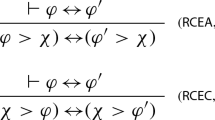Abstract
The paper clarifies and defends the orthodox view that counterfactual conditionals with impossible antecedents are vacuously true against recent criticisms. It argues that apparent counterexamples to orthodoxy result from uncritical reliance on a fallible heuristic used in the processing of conditionals. A comparison is developed between such counterpossibles and vacuously true universal generalizations.
Similar content being viewed by others
References
Brogaard B, Salerno J (2013) Remarks on counterpossibles. Synthese 190:639–660
Dorr C (2008) There are no abstract objects. In: Sider T, Hawthorne J, Zimmerman D (eds) Contemporary debates in metaphysics. Blackwell, Oxford, pp 32–63
Edgington D (2008) Counterfactuals. Proc Aristot Soc 108:1–21
Evans J, Over D (2004) If. Oxford University Press, Oxford
Evans J, Handley S, David O (2005) Suppositions, extensionality, and conditionals: a critique of the mental model theory of Johnson-Laird and Byrne (2002). Psychol Rev 112:1040–1052
Field H (1980) Science without numbers: a defence of nominalism. Blackwell, Oxford
Kment B (2014) Modality and explanatory reasoning. Oxford University Press, Oxford
Kratzer A (2012) Modals and conditionals. Oxford University Press, Oxford
Lewis D (1973) Counterfactuals, 2nd edn. Blackwell, Oxford. Page references to 1986 edition
Lewis D (1976) Probabilities of conditionals and conditional probabilities. Philos Rev 85:297–315
Nolan D (1997) Impossible worlds: a modest approach. Notre Dame J Form Log 38:535–572
Peters S, Westerståhl D (2006) Quantifiers in language and logic. Clarendon Press, Oxford
Stalnaker R (1968) A theory of conditionals. Am Philos Q Monogr 2:98–112
Sterken R (2015) Generics, content and cognitive bias. Anal Philos 56:75–93
Strawson P (1952) Introduction to logical theory. Methuen, London
Vetter B (201X) Williamsonian modal epistemology, possibility based. In: McCullagh M, Yli-Vakkuri J (eds) Williamson on modality. Routledge, London
von Fintel K (1998) The presupposition of subjunctive conditionals. In: Sauerland U, Percus O (eds) The Interpretive Tract, MIT Working Papers in Linguistics 25, pp 29–44
Williamson T (2007) The philosophy of philosophy. Blackwell, Oxford
Williamson T (201X) Modal science. In: Vaidya A (ed) The philosophy of modality: beyond the standard model. Oxford University Press, Oxford
Williamson T (201Y) Counterpossibles in metaphysics. In: Armour-Garb B, Kroon F (eds) Philosophical Fictionalism
Acknowledgments
This paper is based on my 2015 Beth Lecture in Amsterdam. For a much fuller version of the argument and acknowledgements see Williamson (201Y). Two referees gave useful comments.
Author information
Authors and Affiliations
Corresponding author
Rights and permissions
About this article
Cite this article
Williamson, T. Counterpossibles. Topoi 37, 357–368 (2018). https://doi.org/10.1007/s11245-016-9424-x
Published:
Issue Date:
DOI: https://doi.org/10.1007/s11245-016-9424-x




